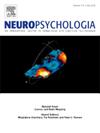走神的“任务”分裂了多重需求和默认模式区域,并增加了失活区域。
IF 2
3区 心理学
Q3 BEHAVIORAL SCIENCES
引用次数: 0
摘要
对不同任务的多需求(MD)区域的激活与做出与任务相关的认知控制变化的需求有关-保持其专注于任务,控制注意力和工作记忆,组织和维护任务模型,以控制何时要做什么的顺序和身份等。需要这种控制的艰巨任务也伴随着审慎的认知,因此认知变化不会自动发生,必须有意识地进行。我们调查了认知的审议性是否激活了与任务相关的需求无关的MD区域。当不从事高要求的任务时,思维会走神。我们要求参与者在任务期间做同样的事情,为了区别于休息,我们要求他们故意和强烈地在随机的想法中徘徊。我们发现一组MD区域——前辅助运动区(preSMA)、前脑岛和额叶中回的后部——在这些时期被激活,而另一组——顶叶内沟、右前额叶前部皮层——被停用。事实上,在这个任务中,一些激活区域(例如,preSMA)比在响应强大的工作记忆更新要求时激活得更多。默认模式网络(DMN)也存在解离。部分颞顶交界处失活,后扣带区和内侧前额叶区激活。最后,我们发现,在“任务”期间,失活区域的活动增加,表明这种增加,之前与顺序组织扩展任务的需求有关,发生在任何解释任务中,包括那些没有这种需求的任务。本文章由计算机程序翻译,如有差异,请以英文原文为准。
The ‘task’ of mind-wandering splits both multiple demand and default mode regions and ramps-up the deactivating regions
The activation of multiple demand (MD) regions to diverse tasks has been linked to the demands of making task-related cognitive control changes – keeping it focussed on task, controlling attention and working memory, organizing and maintaining a task model that will control the sequence and identity of what is to be done when, etc. Demanding tasks that require such control are also accompanied by a deliberative cognition whereby cognitive changes do not occur automatically and have to be made deliberately. We investigated whether the deliberativeness of cognition activates MD regions regardless of task-related demands. When not engaged in demanding tasks, the mind wanders. We asked participants to do the same during task periods, and to differentiate from rests, we asked them to deliberately and intensely wander their minds across random thoughts. We found that a set of MD regions – pre-supplementary motor area (preSMA), anterior insula, and posterior part of the middle frontal gyrus – activated during these periods, and another set – intraparietal sulcus, right anterior prefrontal cortex – deactivated. In fact, some of the activating regions (e.g., preSMA) activated more during this task than in response to robust working memory updating demands. Dissociations were also present in the Default Mode Network (DMN). Parts of the temporoparietal junction deactivated while posterior cingulate and medial prefrontal regions activated. Lastly, we found that the deactivating regions ramped-up their activity across the ‘task’ duration, showing that this ramp-up, previously linked to demands of sequentially organizing extended tasks, occurs during any construed task, including those without such demands.
求助全文
通过发布文献求助,成功后即可免费获取论文全文。
去求助
来源期刊

Neuropsychologia
医学-行为科学
CiteScore
5.10
自引率
3.80%
发文量
228
审稿时长
4 months
期刊介绍:
Neuropsychologia is an international interdisciplinary journal devoted to experimental and theoretical contributions that advance understanding of human cognition and behavior from a neuroscience perspective. The journal will consider for publication studies that link brain function with cognitive processes, including attention and awareness, action and motor control, executive functions and cognitive control, memory, language, and emotion and social cognition.
 求助内容:
求助内容: 应助结果提醒方式:
应助结果提醒方式:


